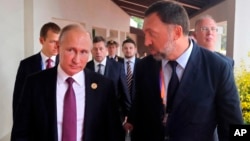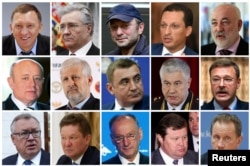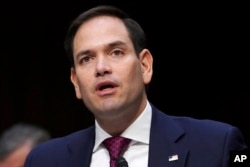The White House has announced sanctions against 38 Russian individuals and companies, saying the United States is standing up to ongoing "malign activity" by the Russian government against Western democracies and around the world.
At Friday's White House briefing, press secretary Sarah Huckabee Sanders said the U.S. still wants to work with Russia.
WATCH: US Raises the Stakes with Tough Sanctions on Russian Oligarchs
"Again, what we would like to see is the totality of the Russian behavior change. We want to continue having conversations and work forward to building a better relationship," Sanders said.
Oligarchs, Russian companies
The sanctions will be imposed on seven Russian oligarchs — including Oleg Deripaska, an aluminum magnate and close ally of Russian President Vladimir Putin — and 12 companies they own or control. Seventeen senior Russian government officials, as well as a state-owned Russian weapons trading company and its subsidiary, a Russian bank, also will be targeted.
The group includes key members of Putin's inner circle.
Those sanctioned will have their assets blocked in the U.S. and people in the U.S. are barred from doing business with them.
Friday, a number of U.S. lawmakers and foreign policy experts welcomed the measure, saying the sanctions are overdue.
Representative Adam Schiff of California, ranking Democratic member of the House Intelligence Committee, said the move is the strongest action taken by the Trump administration to date for Russia's interference in the 2016 U.S. presidential election and "its murder of dissidents at home and abroad."
"The sanctioning of oligarchs like Oleg Deripaska, who is linked to Paul Manafort, Alexander Torshin and Putin's son-in-law, will send a strong message to the Kremlin," Schiff said in a statement.
Florida's Marco Rubio, a Republican senator and former presidential candidate, also welcomed Friday's announcement.
"These new sanctions send a clear message to Vladimir Putin that the illegal occupation of Ukraine, support for … war crimes [under Syrian President Bashar al-Assad's regime], efforts to undermine Western democracies, and malicious cyberattacks will continue to result in severe consequences for him and those who empower him," Rubio said in a statement.
Russia denies its government has interfered in Western elections and allegations that Moscow has had dissidents murdered.
The new sanctions targets include Nikolai Patrushev, secretary of the Russian Federation Security Council.
"I have been in the USA many times. Regarding the fact that they have introduced sanctions, it doesn't mean we will not communicate with them. There are other countries where it is possible to communicate and work to resolve these questions," Patrushev said.
'Devastating blow'
Bill Browder, the CEO of Hermitage Capital — an investment fund and asset management company specializing in Russian markets — and a human rights activist, told VOA the latest round of sanctions is "a devastating blow for Putin and his inner circle," and are likely to have more direct and sustained impact on the Kremlin leadership.
"Every civilized country should follow the USA and impose sanctions," Browder said.
Anders Aslund of the Atlantic Council, an American think tank focusing on international affairs, said the sanctions will be painful for Russia.
"It will essentially mean that these people cannot do business in the U.S. banking system, and that essentially means that you can't do business in dollars, and that will be serious," Aslund told VOA.
Some, including Mark Simakovsky of the Atlantic Council, questioned the timing of the new sanctions.
"These are actions that would have been taken in any normal administration," Simakovsky said. "The question is, because President [Donald] Trump has sought to maintain positive relations with Putin, even congratulating him, why did this administration choose to do this and why now?"
Simavoksy said the new sanctions are unlikely to change Putin's behavior.
"I think this will only further deepen the divide between the U.S. and Russia," he said.
Many experts are watching to see if European Union nations will follow suit with their own tough measures against Moscow, now that the U.S. has taken the lead on sanctioning Russian oligarchs.
This story was written by VOA's Cindy Saine and William Gallo. Iuliia Alieva of VOA Russian and Ia Meurmishvili of VOA Georgian contributed to this report.








